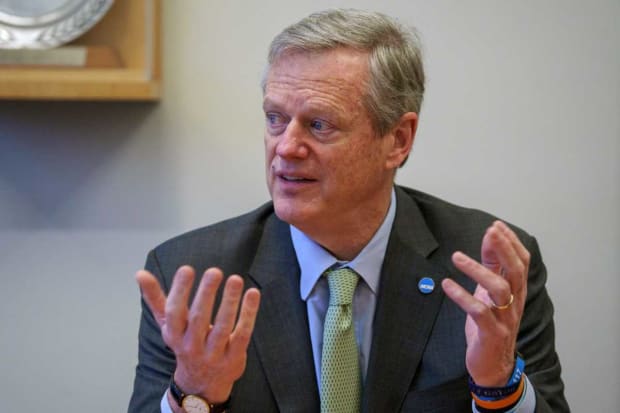Roughly 12 hours after its most celebrated event ended with the sweet sounds of “One Shining Moment,” the NCAA found itself with a new legal battle to fight.
Lawyers filed a multimillion-dollar, antitrust class-action lawsuit against the governing body of college athletics Tuesday, seeking retroactive Alston-related educational payments for college athletes dating back to 2018.
Winston & Strawn LLP and Hagens Berman Sobol Shapiro LLP, the international firms that won the Alston case against the NCAA in the Supreme Court, filed their latest suit in the Northern District of California against both the NCAA and the five Power 5 conferences (Big Ten, SEC, Pac-12, ACC and Big 12). The case names former Oklahoma State running back Chuba Hubbard (who is now with the Carolina Panthers) and former Auburn track athlete Keira McCarrell as plaintiffs.
The Hubbard-McCarrell case seeks triple damages on behalf of current and former Division I college athletics for injuries suffered from rules found to be unlawful in the Alston litigation. The NCAA lost the Alston case 9–0 in the Supreme Court, requiring the association to allow schools to distribute as much as $5,980 a year to athletes in education-related compensation. Since the June 2021 Supreme Court ruling, at least 50 programs are doling out the Alston funds to athletes, attorneys say.
Attorneys contend that at least 5,000 athletes are owed two years of back Alston payments from 2018–19 and ’19–20, but that number could climb to more than 20,000 athletes, putting damages at a minimum of $200 million and as much as $1 billion.
“This is another way to bring justice to the NCAA victims,” says Winston & Strawn co-executive chairman Jeffrey L. Kessler.
The Hubbard lawsuit is the latest legal challenge threatening to further erode the NCAA’s bedrock of amateurism. The case is similar to another suit, House vs. NCAA, filed by the two law firms that claims athletes are owed name, image and likeness pay dating back to 2016. It also seeks revenue-sharing from television deals and an injunction of any current NCAA rules that restrict athletes from earning NIL, a concept that college leaders say has thrust the industry into “chaos.”
A class certification hearing is set for September in the House case. A trial could start in 2024. Attorneys have spent the last few months and will spend the coming months performing depositions and collecting NIL figures from individual schools to ascertain damages owed to athletes. Kessler says lawyers already have uncovered “a ton of documents,” all of them under seal.
“All we can do is tell you that the numbers are large,” he says. “Despite all these NIL deals, the NCAA is doing great. There’s been no harm for consumer interest or competitive balance. I think most people would say that the NCAA and its various sports are successful as they’ve ever been. They just had the highest-watched women’s tournament in history by far and probably the most competitive parity in the men’s tournament.”
The two lawsuits are not the only threats to the NCAA’s model. A suit in Pennsylvania, Johnson v. NCAA, and a complaint to the National Labor Relations Board could both lead to athletes being deemed employees of their schools.
Meanwhile in California, state lawmakers have proposed a bill that would require its schools to share revenue with athletes. If passed, the law may ignite more states to follow suit in the same way that they did NIL.

Mykal McEldowney/IndyStar/USA TODAY NETWORK
Led by new president Charlie Baker, the NCAA is seeking a federal solution to all of these matters. They are hoping Congress can pass a uniform NIL policy while also granting it protections from antitrust issues and preventing athletes from being employees.
“The NCAA has been operating for 50 years as if they are exempt from antitrust laws,” says Steve W. Berman, Hagens Berman’s managing partner and cofounder. “The Supreme Court made it clear they aren’t. They want to go back to Congress and establish the status quo making them immune from the antitrust laws. No one else in the United States has that luxury. Why should they? We think it is pretty outrageous.”
Both the Chubbard and House cases could cost the NCAA billions if they are settled or if the organization loses in court—as it often has recently. Many within college athletics believe the cases are so costly they could lead to the collapse of the organization.
Kessler describes such a sentiment as “nonsensical” and cites the enormous revenues that the NCAA and the Power 5 leagues generate from TV contracts, booster donations and season-ticket sales. The Big Ten, for instance, recently agreed to a media rights contract that will eventually exceed $1 billion a year.
“The collective revenues for the Power 5 conferences and NCAA every year is larger than the annual revenues of any sport in the U.S. except for the NFL. They are higher than the revenues of the NBA, MLB and NHL,” he says. “This is not about crippling the NCAA. It’s about economic justice for their athletes.”







